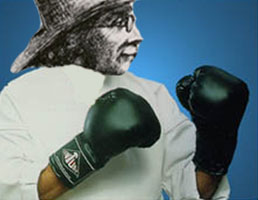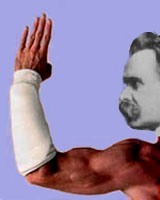

KIERKEGAARD VS. NIETZSCHE


K: "When [Socrates] spoke about the beautiful, when in the longing of his thought and discourse for the beautiful he transported the listener, who now inadvertantly happened to look at him, he became twice as ugly as he already was, he already was the ugliest man in the nation... But in the confidence of being himself the ugliest, he believed that with a good conscience he could say everything, everything in praise of beauty without having the slightest advantage from it, he who thereby only became uglier and uglier." - Second Series, X. The Work of Love in Praising Love, pp. 371-372Sensuality:
N: "...Ugliness, in itself an objection, is among the Greeks almost a refutation. Was Socrates a Greek at all? Ugliness is often enough the expression of a development that has been crossed, thwarted by crossing. Or it appears as declining development. The anthropologists among the criminologists tell us that the typical criminal is ugly: monstrum in fronte, monstre in animo. But the criminal is a decadent. Was Socrates a typical criminal?" - The Problem of Socrates, 3, p. 475
K: "...Just because Christianity is truly spirit, it understands by the sensuous something quite different from what is simply called the sensuous nature, and it has been no more scandalized by a drive human beings have indeed not given to themselves than it has wanted to forbid people to eat and drink. By the sensuous, the flesh, Christianity understands selfishness. A conflict between spirit and flesh is inconceivable unless there is rebellious spirit on the side of flesh, with which the spirit then contends; similarly, a conflict between spirit and a stone or between spirit and a tree is inconceivable. Therefore, self-love is sensuousness. Christianity has misgivings about erotic love and friendship simply because preferential love in passion or passionate preference is actually another form of self-love." - First Series, II. B. You Shall Love the Neighbor, pp. 52-53Death:
N: "Destroying the passions and cravings, merely as a preventative measure against their stupidity and the unpleasant consequences of this stupidity -- today this itself strikes us as merely another acute form of stupidity... The church fights passion with excision in every sense: its practice, its 'cure,' is castratism It never asks: 'How can one spiritualize, beautify, deify a craving?' It has at all times laid the stress of discipline on extirpation (of sensuality, of pride, of the lust to rule, of avarice, of vengefulness)." - Morality as Anti-nature, pp. 486-487
K: "When the couch of death is prepared for you, when you go to bed never to get up again and they are only waiting for you to turn to the other side and die, and the stillness grows around you -- then when those close to you gradually leave and the stillness grows because only the most intimate ones remain; and then when the last one has bent over you for the last time and turns to the other side because you yourself are now turning to the side of death -- there still remains one on that side, the last one by the deathbed, he who was first, God, the living God." - First Series, III. B. Love is a Matter of Conscience, p. 150A La Kevorkian:
N: "Death freely chosen, death at the right time, brightly and cheerfully accomplished amid children and witnesses: then a real farewell is still possible, as the one who is taking leave is still there; also a real estimate of what one has achieved and what one has wished, drawing the sum of one's life -- all in opposition to the wretched and revolting comedy that Christianity has made of the hour of death." - Skirmishes of an Untimely Man, 36, pp. 536-537
K: "The commandment said, "You shall love your neighbor as yourself," but if the commandment is properly understood it also says the opposite: You shall love yourself in the right way... When the depressed person desires to be rid of life, indeed, of himself, is this not because he is unwilling to learn earnestly and rigorously to love himself? ... if, alas, a person presumptuously lays violent hands upon himself, is not his sin precisely this, that he does not rightly love himself in the sense in which a person ought to love himself?" - First Series, II. A. You Shall Love, pp. 22-23Freedom:
N: "When one does away with oneself, one does the most estimable thing possible: one almost earns the right to live. Society -- what am I saying? -- life itself derives more advantage from this than from any 'life' of renunciation, anemia, and other virtues: one has liberated the others from one's sight; one has liberated life from an objection." - Skirmishes of an Untimely Man, 36, p. 537
K: "...A free heart is required for love or giving oneself in love. This heart must not belong to anyone else or to anything else; yes, even the hand that gives it away must be free... This heart, free as it is, will then find total freedom in giving itself away. Nothing -- the bird you release from your hand, the arrow from the slackened bow string, the bent branch that snaps back -- nothing is as free as the free heart when it freely gives itself away. The bird is free only because you let it go, and the arrow speeds forward only because it leaves the bow-string, and the branch snaps back only because the pressure ceases; but the free heart does not become free through the cessation of resistance -- it was free, it had its freedom -- and yet it found its freedom. What a beautiful thought, what blissful freedom that finds what it has!" - First Series, III. B. Love is a Matter of Conscience, pp. 147-148Bibliography:
N: "Freedom means that the manly instincts which delight in war and victory dominate over other instincts, for example, over those of 'pleasure.' The human being who has become free -- and how much more the spirit has become free -- spits on the contemptible type of well-being dreamed of by shopkeepers, Christians, cows, females, Englishmen, and other democrats.The free man is a warrior." - Skirmishes of an Untimely Man, 38, p. 542
 Round 1
Round 1